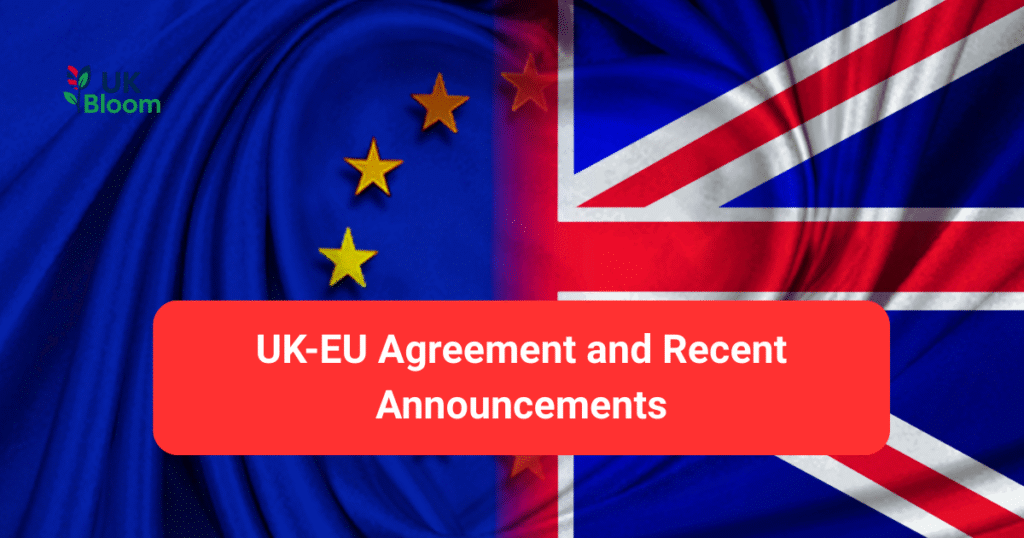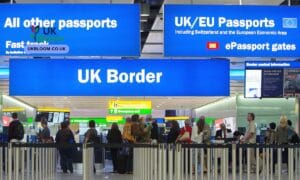Let’s face it—Brexit left quite the hangover. After years of negotiations, disagreements, and political drama, the UK-EU Agreement and Recent Announcements have now settled into a new, if uneasy, rhythm. But guess what? Things are moving again. With recent agreements and fresh announcements, it looks like both sides are finally learning how to play nice—or at least, nicer.
So, what’s been happening? Grab a cuppa and let’s unpack it all.
UK-EU Agreement and Recent Announcements
The Brexit Deal: A Game Changer
Remember when the UK officially left the EU on January 31, 2020? That was just the beginning. The Trade and Cooperation Agreement (TCA), signed in December 2020, was the real rulebook post-divorce. It laid out how the two sides would trade, cooperate, and function without stepping on each other’s toes.

But, surprise! It wasn’t smooth sailing.
Trade and Travel: Early Ripples
In the early days, businesses struggled with paperwork nightmares, truck queues, and lost sales. Travelers found themselves surprised by new visa rules and roaming charges. The new relationship felt less like a handshake and more like an awkward fist bump.
Table of Contents
What’s New? Recent Announcements That Matter
Fast-forward to 2024–2025, and the dialogue has shifted. The UK and EU are adjusting, updating, and—dare we say—working together?
Trade and Tariff Tweaks
One of the biggest headlines? An agreement to reduce red tape on goods moving between Great Britain and Northern Ireland. The Windsor Framework (more on that soon) smoothed out some friction. Plus, new digital tools are being introduced to make customs processes faster and cheaper.
Migration and Mobility Shifts
The UK is inching toward more flexible visa schemes for EU citizens, especially for skilled workers in sectors like healthcare and tech. Think of it as opening the door—but not throwing it wide open.
Financial Services Updates
While the UK lost its financial passporting rights post-Brexit, both sides are now working on a Memorandum of Understanding (MoU) to coordinate better. It’s not a love letter, but it’s not a breakup note either.
The Windsor Framework: A Fresh Approach to Northern Ireland
What Is It Exactly?
The Windsor Framework is the UK and EU’s latest attempt to fix the infamous Northern Ireland Protocol issues. It’s a remix of earlier agreements—but with fewer headaches.
Key Takeaways from the Agreement
- A “Green Lane” for trusted traders to move goods within the UK.
- Stormont Brake: Gives Northern Ireland more say over EU rules.
- Digital customs: Easier declarations and fewer checks.
In short, it’s about keeping peace without constant paperwork.
Also refer: Types of Visas in the UK
Changes for Travelers and Tourists
Visa Rules and Border Controls
EU tourists can still visit the UK for up to 6 months visa-free. But for work, study, or longer stays? Paperwork is unavoidable. Brits heading to the EU face a 90-day limit within any 180 days unless they secure a visa.
Driving, Roaming, and More
You’ll need a UK sticker on your car, possibly an International Driving Permit, and yes, your mobile bill could take a hit without those sweet EU roaming caps.
Impact on Businesses: Winners and Losers
Exporters and Importers
UK exporters to the EU still face customs declarations, origin rules, and sometimes even tariffs if the paperwork isn’t perfect. But new tools and agreements are easing the pain a bit.
SMEs vs Large Corporations
Small businesses got hit the hardest. While big firms had the resources to adapt, SMEs often struggled. Thankfully, UK support schemes and EU cooperation are helping to bridge the gap.
Students and Education Exchange
Erasmus vs Turing Scheme
The UK dropped out of Erasmus and replaced it with the Turing Scheme. While it offers global opportunities, critics say it lacks the cultural exchange vibe of Erasmus.
Recognition of Qualifications
Working as a doctor or lawyer across borders? You’ll need to jump through new hoops. Some professions now require dual qualifications or recertification.
Political Reactions: Cheers and Concerns
Reactions have been mixed. Some UK politicians hail the recent agreements as proof of sovereignty and smart diplomacy. Others say we’re just patching up problems we created ourselves.
Across the Channel, EU leaders seem cautiously optimistic. There’s no rush to rekindle romance—but hey, they’re texting again.
Future of UK-EU Relations: Are We Friends Again?
Cooperation Over Competition
Both sides are realizing that competition is fine, but cooperation is cheaper. From climate goals to research partnerships, shared interests are back on the table.
Potential Flashpoints
Fishing rights, border checks, and data privacy could still stir the pot. And don’t forget the wild card: changes in political leadership could shift the tone overnight.
Conclusion: What Should You Watch Out For?
So, what’s next? The UK-EU relationship is still a work in progress, but the tone has changed. It’s less about walking away and more about figuring things out over coffee. For businesses, travelers, and students, staying informed is key.
The days of daily Brexit headlines may be over, but the ripple effects? Still very much here.
FAQs
1. What is the Windsor Framework, and why is it important?
The Windsor Framework is a UK-EU agreement that simplifies trade rules between Great Britain and Northern Ireland. It helps reduce bureaucracy and keeps peace under the Good Friday Agreement.
2. Can UK citizens still work in the EU?
Yes, but it’s more complex. Depending on the country and job, you’ll likely need a visa, work permit, or both.
3. Has anything changed for EU students studying in the UK?
They now need student visas and can’t pay UK tuition rates unless they have settled status or other exceptions.
4. What’s happening with UK-EU travel rules in 2025?
Travelers still enjoy short-term, visa-free visits, but longer stays, driving regulations, and mobile charges have changed significantly.
5. Will there be another UK-EU agreement in the future?
Very likely. The current agreements are evolving, and both sides are open to tweaking terms as needs and politics shift.






